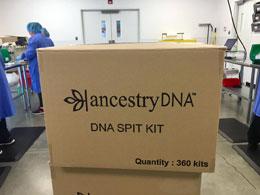 As Canada resorts to using DNA and ancestry websites to confirm the nationality of illegal immigrants, India has said no to such a policy citing privacy and ethics issues.
As Canada resorts to using DNA and ancestry websites to confirm the nationality of illegal immigrants, India has said no to such a policy citing privacy and ethics issues.
The Indian government has rejected a proposal from the United Kingdom over the use of DNA testing to confirm the nationality of illegal immigrants, the Hindu reported, citing sources.
“In one of the meetings, the U.K. authorities suggested that the nationality of document-less illegal migrants suspected to be Indians could be established by matching DNA samples of their family members living here. We raised objections that this was a breach of privacy and unethical. How do we know that the document-less person is an Indian,” the publication quoted a senior Home Ministry official as saying.
A Memorandum of Understanding on the return of illegal migrants was approved in January by the Minister of State for Home Affairs, Kiren Rijiju, but India chose not to sign the final draft of the pact when Prime Minister Narendra Modi visited the United Kingdom in April this year.
The MoU specified that Indian security agencies would verify the antecedents of the immigrants who do not possess any documents within 72 days while the time frame was set as 15 days for persons who carried identification papers. If no report was filed within the given frame, the immigrant would be deported from the United Kingdom, according to the MoU. But the pact was kept on indefinite hold after National Security Adviser Ajit Doval conveyed that the 15-day limit was unworkable, the report added.
The British government is also at variance with the Indian government over the estimated number of illegal Indians living in the United Kingdom. While the UK government says that the number of Indians staying illegally is as high as 100,000, the Indian government puts the figure at 2,000.
UK Prime Minister Theresa May said in June this year that she will not ease steps to crack down on illegal immigration. Members of the public in the United Kingdom want to know that the government is taking action against people who come to the country in an illegal manner, May had said in Quebec, Canada, where she was attending the G7 summit.
Meanwhile, a Vancouver immigration lawyer said Canada’s use of DNA and ancestry sites in detainees’ deportation cases are problematic.
These comments come following recent reports of a practice by the Canadian Border Services Agency (CBSA) that involves obtaining consent from long-term detainees to take a DNA sample and submit it to commercial ancestry sites — ancestry.com and familytree.com, for example — as a way of gleaning information on nationality.
Vancouver immigration lawyer Peter Edelmann says there are several issues with this practice, starting with the CBSA using the threat of indefinite detention as a way of getting consent, according to an article in Lawyer’s Daily.
“What ends up happening in these long-term detainee cases is that these people are detained for a long period of time with an implicit or explicit allegation that they are non-cooperative, and if you don’t cooperate, you won’t be released,” said Edelmann. “So the detention is being used as a tool of coercion to get people to cooperate with their own removal. So, when you say the person is ‘consenting,’ the question is, what happens if they don’t consent?
‘Well yes, you’re consenting to a DNA swab, but if you don’t consent we’re going to hold you in jail indefinitely until you do, because otherwise we’re going to make allegations that you are non-cooperative, and, therefore, your detention can continue indefinitely.’ If that’s the context of the consent, that is not consent at all. That is flat out, no-questions-asked coercion.”
In contrast, said Edelmann, Canada’s Criminal Code has strict conditions around when a DNA sample can be taken and how it is used.
Courtesy Asian Pacific Post






